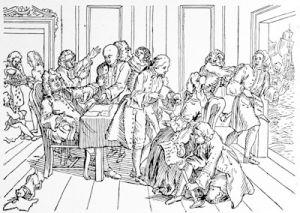
Fleury's objects were advanced by the War of the Polish Succession which began in 1733 and was ended in 1737. The kingdom of Poland was elective, and all the European Powers ranged themselves on the side of one or other of two opposing candidates for the throne. Great Britain alone kept clear, though King George, as Elector of Hanover, was extremely anxious to plunge into the war in support of the Imperial candidate.
The result was that Europe was deluged with blood, and all the treasuries were exhausted, while Britain remained at peace and accumulated wealth. Otherwise, the points in the redistribution of territory to be noted are that the king of Spain's second son was established as king of the Two Sicilies; and that Francis, Duke of Lorraine, who was about to marry Maria Theresa the daughter and heiress of the Emperor, received the dukedom of Tuscany, and in effect surrendered Lorraine itself to France.
To the Emperor Charles the main satisfaction was found in the guaranteeing by the Powers of the Pragmatic Sanction, an instrument which, in defiance of precedent recognised his daughter Maria Theresa as the heiress of the Austrian dominion.
The Causes of War
Six years after the Family Compact the whole fabric of Walpole's peace policy had melted into thin air. Britain and Spain plunged into war, and in a very short time all Europe was once more in conflagration. But neither the Family Compact nor the intervening War of the Polish Succession was directly responsible for the Anglo-Spanish quarrel or the War of the Austrian Succession. British and Spaniards flew at each other's throats over a quarrel which had been standing for nearly two centuries; neither people knew anything about Family Compacts.
The War of the Austrian Succession arose because the Emperor Charles VI had neither a son nor a brother, nor even a nephew, and the king of Prussia discovered in the fact an opportunity for rounding off his dominions.
Looking back on the circumstances in the light of later history, it is easy to observe that the two wars between 1739 and 1763 settled a question of vital importance in the world's history by giving to the British race a decisive supremacy over all European rivals in North America and in India; but obviously, when the fighting began, the combatants did not realise the nature of the stake.
They were not fighting for that stake. The French government ought have been directed by the consciousness that there was not room either in North America or in India for both French and English; the Bourbon conspiracy ought have been one primarily for the suppression of Great Britain, the appropriation of the Western Hemisphere by the Bourbons, and the establishment of a French Empire in India.
The political instinct of the British race ought have led the nation to force the hand of a too timid minister and compel him to strike at Spain before the conspiracy was ripe. But, as a matter of fact, the conspiracy was aimed primarily against Austria, and only in the second place against British maritime supremacy, not consciously against British colonial expansion.
The proof lies in the fact that the conspirators made no sort of preparations to challenge the British maritime supremacy in the one conceivably effective manner, namely, by the creation of rival fleets. Neither the French nor the British governments had given a second thought to the idea of dominion in India.
And the British nation forced the hand of the British minister, not influenced by an instinctive perception of great imperial necessity, but because it lost its temper. The Englishman who knew of the Family Compact, who was convinced that France would make common cause with Spain, who believed that his country would not be able to stand up against the united Bourbons, was the minister whose hand was forced, the minister who hated and dreaded the war, Robert Walpole.
This article is excerpted from the book, 'A History of the British Nation', by AD Innes, published in 1912 by TC & EC Jack, London. I picked up this delightful tome at a second-hand bookstore in Calgary, Canada, some years ago. Since it is now more than 70 years since Mr Innes's death in 1938, we are able to share the complete text of this book with Britain Express readers. Some of the author's views may be controversial by modern standards, particularly his attitudes towards other cultures and races, but it is worth reading as a period piece of British attitudes at the time of writing.
History
Prehistory - Roman
Britain - Dark Ages - Medieval
Britain - The Tudor Era - The
Stuarts - Georgian Britain - The Victorian Age

